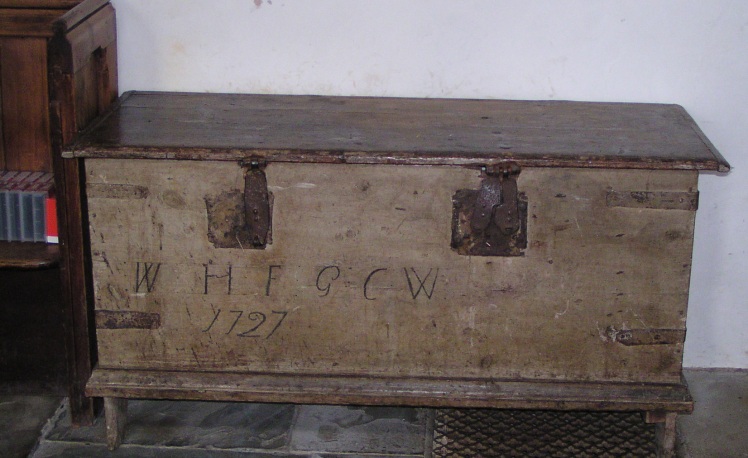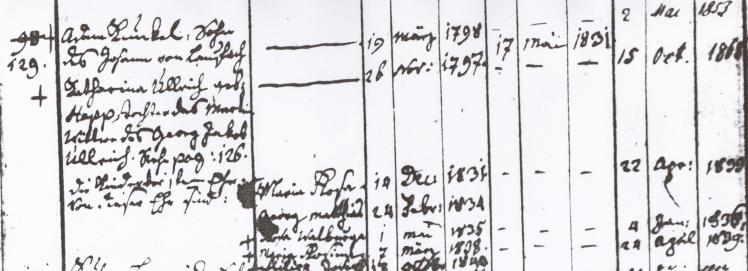 This is Week 10 in my Beyond the Internet series of topics in which I explore the sources of information beyond our computer screens. I’d love it if you wanted to join in with your own posts on this week’s topic which is Church Records.
This is Week 10 in my Beyond the Internet series of topics in which I explore the sources of information beyond our computer screens. I’d love it if you wanted to join in with your own posts on this week’s topic which is Church Records.
Please join in with your blog posts on this topic, and if possible provide the link on this page.
Last week’s topic was church registers: the records of baptisms, marriages and burials kept by parishes in the important era prior to civil registration, taking you back into the 17th and 18th centuries of earlier if you’re lucky. They remain relevant, although less critical, for the modern day.
This week looks at the other records kept by the churches which may provide invaluable clues to your family’s history, as well as that of the local parish where they live. In earlier days the parish was responsible for many of the day-to-day functions of the area, for example, the state of the roads; care of the poor, sick or destitute; foundling children; collection of tithes etc. The potential for finding snippets or nuggets of information about your family is pretty good. You may even find a signature for a distant ancestor who fulfilled ones of the parish responsibilities. The records were kept in a locked chest hence the name “parish chest”.
In this topic I’ll highlight a few of the parish records sources I’ve found useful in my own research. I’ve mainly looked at these records for Scotland and England but first let me mention an invaluable resource for German research.
FAMILIENBÜCHER (family books) (Germany)
You will find the standard baptisms and marriages (and sometimes burials) in the church registers but the familienbücher are especially worth seeking out, if you can access them. In essence they document each family as an entity. So when a married couple starts out their children are progressively added to the entry, sometimes with comments about emigration or relocation. Each son’s entry is cross-referenced to his new family once he marries, and each daughter’s entry refers to her husband’s name and her new family. Excellent value.
My hint: Don’t forget that there’s more than one religion in the old German states so do check place information for what churches were in your family’s area. It’s worth remembering that much of the southern areas of Germany are Catholic.
How to find them: The Familienbücher may be microfilmed by the Church of Jesus Christ of Latter Day Saints (LDS), so try the Family Search catalogue. If not, they should be with the local parish or with the regional church archives.
KIRK SESSIONS (Scotland)
My 2011 posts here and here referred to these wonderful records in some detail so I won’t repeat it here. They provide a unique insight into the day-to-day life in your family’s parish.
My hint is: don’t just search for your family’s name. In my experience reading the sessions for Inishail parish, each entry makes reference to families or individuals who may have no genealogical link to the key person and you may find yours among them.
How to find them: Essentially only available at (some) Scottish archives, most particularly Edinburgh. Still it would be worth checking the Family Search catalogue to see if your parish’s records have been microfilmed. I’m longing for the day when ScotlandsPeople makes them available on line. I just hope it’s a full-subscription site because I don’t just want to look at odd pages with my family’s name.
OVERSEERS OF THE POOR (England)
If your family had some land and/or parish status, you may well find them taking on the responsibilities of overseer of the poor. The parish records may reveal their signature, how often they served and other extant information. I learnt that one strand of my ancestry served in parish roles for over 100 years – it was interesting to see how this had carried down the years. Genetics or training? If the family was poor, you may find references to them in the parish minutes.
How to find them: Search the Family Search catalogue for your parish and see what church records they have other than parish registers.
Hint: click on each entry to see what it includes. If you think it might be helpful give it a whirl. All you stand to lose is a few dollars and some time offset by the potential of finding something quite different about your families.
The local parishioners chosen to be Surveyors of the Poor may also be in the parish chest/church records and again give you insight into your family’s responsibilities and engagement.
ENCLOSURE AND TITHE RECORDS
The parish chest records may provide information on tithe and enclosure within your parish. This may list the amounts payable by each individual in the parish and their land and property name. Obviously this is invaluable information for your family’s story. This post elaborates on the impact this information had on my own family history. In other urban parishes I’ve found entries where the relevant parish official has gone door-to-door finding out who lives there and listing their liability.
How to find them: Again try the Family Search catalogue for your parish or the relevant archives for that area.
UNOFFICIAL PARISH CENSUSES
Some parishes have wonderful informal parish censuses in their records. You will give thanks if you find one of these. I’ve seen one (sadly not my parish, and also sadly I’ve forgotten which Northumberland parish it was) which said the woman “was very clean for a Catholic” and other equally acerbic comments.
HINT: If you would like to learn more about these wonderful records you might like to enrol in the Pharos course on the Parish chest.
FINAL HINT: Not everything has been microfilmed, digitised or indexed. Sometimes you need to dig deeper by approaching the local parish (offering them a donation to thank them for their time) or be visiting or contacting the relevant archives. Sometimes you’ll draw a blank but if you get lucky you’ll be delighted with how it enriches your story.


I’ve discovered that many of the records of a church that is important for my genealogical research were thrown away. It’s so sad that people sometimes don’t see that value of old records and instead just consider them “clutter”.
LikeLike
That’s so sad and frustrating Sheryl. I feel for you. Much the same thing happened with family papers from the old Kunkel farm- makes me want to weep when I think about it.
LikeLike
How dreadful Sheryl. Very frustrating. Is there any references to your parish of interest in a neighbouring one? Did they perhaps share a Vicar?
LikeLike
Mine is up at http://anglersrest.blogspot.com/2012/03/beyond-internet-week-10-church-records.html
LikeLike
Those Familienbücher sound brilliant. If only I could find one in one of the parishes I’m interested in! This is a very helpful post thanks Pauleen. : )
LikeLike
You’re welcome Prue. Let’s hope one surfaces -may be in an archive just not microfilmed perhaps.
LikeLike